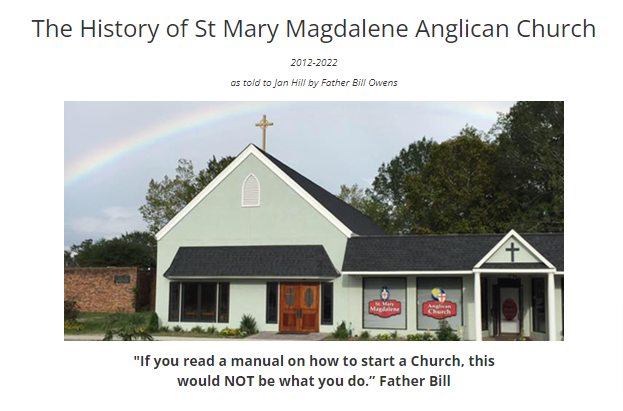About Us
About Mary Magdalene
Mary Magdalene was a Jewish woman, of the tribe of Isaachar, born in the city of Magdala (thus her name, "Mary of Magdala" or "Mary Magdalene"). Her family was very devout and she was raised in traditional Jewish piety.
She was orphaned at the age of ten, but continued her pious life while growing up among her extended family, attending the synagogue frequently and reading the Scriptures. By the way, it was not uncommon for Jewish women of that time to be educated and to read the Scriptures at home.
Apparently, she was a woman of some means, and her family of some significance for she helped support the work of Jesus and His disciples, and later had access to Caesar in Rome. After Jesus' death and burial, Mary Magdalene was naturally among His kinswomen who came to the tomb early in the morning to complete the process of preparing His body for burial since Joseph of Arimathea and Nikodemos were forced to do so hurriedly on Friday afternoon before the sun set and the Sabbath began. After the resurrection, Mary Magdalene became a strong witness and traveling preacher of the Gospel, and for this she is referred to as an "equal to the Apostles." Mary Magdalene died peacefully and was buried in a cave that is said to be the same place where years later the Seven Sleepers of Ephesus were buried. Her relics were later taken to Constantinople.
All About Anglicanism (The ACNA)
THE BASICS
First and foremost, Anglicans are Christians. Globally, Anglicans form the third largest body of Christians in the world (around 80 million members) behind the Roman Catholic and Eastern Orthodox churches.
ORIGINS OF THE NAME
The name “Anglican” is traced back to the ancient Anglo-Saxon tribes of Europe. The tribal name was spelled “Engles” or “Angles” and the tribe’s speech was the precursor to the English language. Their island became known as England, and their Christians were known as Anglicans. The name has nothing to do with “angels.”
GLOBAL ANGLICANS
Just as the English language spread with the British empire, so did Anglican Christianity. When Anglicans resettled in new lands, they brought their personal faith with them. Chaplains and pastors were often among their number. Additionally, many Anglicans traveled as missionaries to share the Gospel. Consequently, Anglican churches now exist all over the world in more than 165 countries. As Anglican Christians became a global family, the demographics shifted dramatically. While Christians from Britain, the United States, Canada, and Australia continue to play an important role, today the “average” Anglican is a young woman from Sub-Saharan Africa.
THREE STREAMS
The Anglican ethos holds together three streams of the Christian Church. For those familiar with Church History, Dr. Les Fairfield provides a synopsis of the history that shapes its life today:
The Protestant movement recalled the 16th century Church to the primacy of the Word—written, read, preached, inwardly digested. The 18th century Holiness movement reminded the Church of God’s love for the poor. The Anglo-Catholic movement re-grounded the Church in the sacramental life of worship. All three strands are grounded in the Gospel. Each one extrapolates the Gospel in a specific direction. No strand is dispensable. Other Christian bodies have often taken one strand to an extreme. By God’s grace the Anglican tradition has held the streams in creative tension. This miracle of unity is a treasure worth keeping.
WORSHIP
Anglican worship is diverse, and it is best understood by visiting and attending a local congregation. What is common to all is an inheritance of worship that recognizes the supremacy of the Bible and often finds expression through the Prayer Book. To understand what and how Anglicans pray is to understand what they believe. The Prayer Book, described as the Scriptures arranged for worship, provides helpful resources for everything from personal daily devotions to large public gatherings of worship. It includes prayers for every season of life.
Taken from the ACNA website: anglicanchurch.net
The Diocese of the Carolinas

The Anglican Diocese of the Carolinas is a diocese of the Anglican Church in North America. We are comprised of Anglican parishes and missions in North and South Carolina.
The Anglican Diocese of the Carolinas exists to equip clergy and congregations to fulfill the Great Commandments (Mk.12:29-31) and the Great Commission (Mt.28:19-20) by leading people into a growing relationship with Jesus Christ through evangelism, personal discipleship, and the nurturing and planting of congregations
ACNA
 Anglican1000 is an initiative of the Anglican Church in North America and her ministry partners to raise up Anglican congregations and communities of faith across North America to reach people with the transforming love of Jesus Christ.
Anglican1000 is an initiative of the Anglican Church in North America and her ministry partners to raise up Anglican congregations and communities of faith across North America to reach people with the transforming love of Jesus Christ.
During his investiture service in 2009, the Church’s first archbishop, The Most Rev. Robert Duncan, made the astonishing, prophetic call to plant a 1000 new congregations. A few months later, a team of leaders gathered in Plano to dream about a cooperative movement to plant churches and answer this call, and in 2014, 500 of the first 1,000 churches have now been planted.
Consecration of St. Mary Magdalene Anglican Church in Camden, SC

